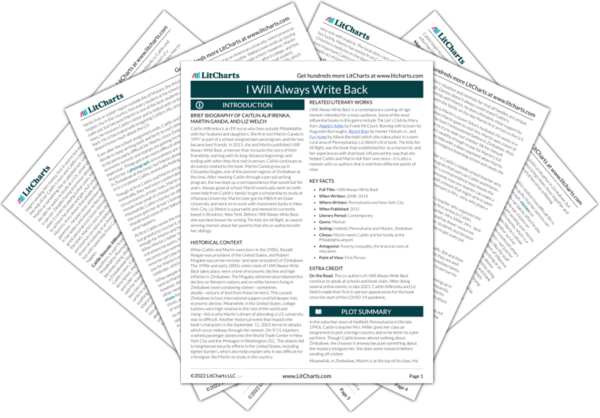Martin’s Mother (Chioniso Ganda) Quotes in I Will Always Write Back
Toward the end of 1998, things really began to disintegrate for my family. I was just about to finish Form Two, the equivalent of eighth grade in America. Nation and I began working after school as well as weekends in order to help feed our family. My father’s paycheck was never enough. It was rough. Worse, I could see how it affected my father. He was no longer singing when he came home, if he came home at all. Some nights he’d creep in late, well after we had all gone to sleep. I’d wake up, not from any noise but from the sweet, rancid smell of Chibuku.
A lesser man may have been threatened by Caitlin’s generosity. Here was a fourteen-year-old girl sending us more money than my father made in several months. My father only had love and respect for Caitlin. Her letters had always been precious to me. Now they were also crucial to my whole family. We were on a ship that was sinking, huddled at the tip before it went under. Caitlin’s gift was a lifeboat.
My mother was afraid to keep this much money in our house. It made us a target in these difficult times.
Thank you for your effort, love, and time. Thank you for the shoes you gave us. My mom, I repeat, is now counted as a human in society.
Hours later, a nurse confirmed it was malaria—thankfully not cerebral. She needed IV fluids immediately. She was so dehydrated that she was at risk of dying without them. But the hospital couldn’t afford to supply any medicine. Instead, the nurse told us what we needed, and then we had to secure it.
“There is a man outside wearing a blue shirt,” she said. “He sells IVs.”
I have no idea what any of these young people will do with the emotions our story stirred in each of them—but I am excited by the possibilities. It’s why I wanted to write this book.
Kindness is contagious. It changes lives. It changed mine. What will it do for you?

Martin’s Mother (Chioniso Ganda) Quotes in I Will Always Write Back
Toward the end of 1998, things really began to disintegrate for my family. I was just about to finish Form Two, the equivalent of eighth grade in America. Nation and I began working after school as well as weekends in order to help feed our family. My father’s paycheck was never enough. It was rough. Worse, I could see how it affected my father. He was no longer singing when he came home, if he came home at all. Some nights he’d creep in late, well after we had all gone to sleep. I’d wake up, not from any noise but from the sweet, rancid smell of Chibuku.
A lesser man may have been threatened by Caitlin’s generosity. Here was a fourteen-year-old girl sending us more money than my father made in several months. My father only had love and respect for Caitlin. Her letters had always been precious to me. Now they were also crucial to my whole family. We were on a ship that was sinking, huddled at the tip before it went under. Caitlin’s gift was a lifeboat.
My mother was afraid to keep this much money in our house. It made us a target in these difficult times.
Thank you for your effort, love, and time. Thank you for the shoes you gave us. My mom, I repeat, is now counted as a human in society.
Hours later, a nurse confirmed it was malaria—thankfully not cerebral. She needed IV fluids immediately. She was so dehydrated that she was at risk of dying without them. But the hospital couldn’t afford to supply any medicine. Instead, the nurse told us what we needed, and then we had to secure it.
“There is a man outside wearing a blue shirt,” she said. “He sells IVs.”
I have no idea what any of these young people will do with the emotions our story stirred in each of them—but I am excited by the possibilities. It’s why I wanted to write this book.
Kindness is contagious. It changes lives. It changed mine. What will it do for you?











